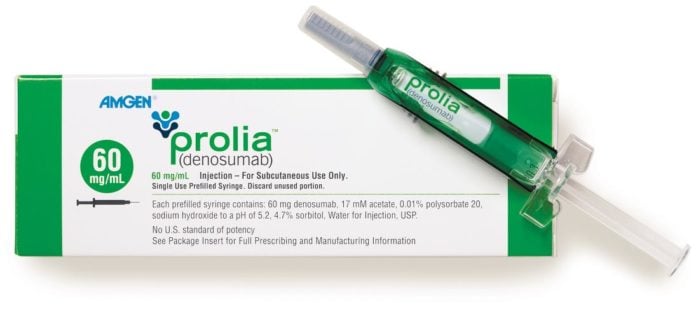Thousand Oaks biotech giant Amgen Inc. marked the new year with both some bad news and a positive development.
On the unwelcome news front, on Jan. 19, the Food and Drug Administration announced it was placing a “boxed warning” label on all units of Amgen’s blockbuster drug Prolia, which is commonly used to treat osteoporosis in both men and women. The warning is for the possibility of advanced kidney disease patients developing dangerously low calcium levels – especially patients on dialysis.
The positive development was Amgen’s Jan. 8 announcement that it was teaming up with Santa Clara tech giant Nvidia Corp. to build generative artificial intelligence models to aid in the discovery of biomarkers and help develop precision medicine therapies.
Prolia warning label
Prolia is the brand name for the drug denosumab, and it is Amgen’s number two drug ranked by sales volume, closely trailing leader Enbrel.
During the third quarter, Amgen reported $986 million in sales of Prolia, up 14% from the same quarter a year earlier. That compares with $1.02 billion in third quarter sales of Enbrel, which was down 6% year over year. Amgen then projected that roughly 7 million patients would be treated with Prolia for all of last year.
This growth, though, may not last. Prolia is slated to lose its patent protection in February of next year, opening the door for generic alternatives.
The boxed warning is the most serious warning level issued by the FDA to warn consumers and health care professionals about potentially dangerous side effects. The agency acted after its investigation into a series of complaints about low calcium levels among patients with advanced chronic kidney disease.

The agency’s warning advises patients considering using Prolia to consult with a health care professional with expertise in kidney disease. It advises patients already taking Prolia to ensure they are getting adequate calcium and Vitamin D intake and, if necessary, take steps to boost that intake. And for those patients with kidney disease who are taking Prolia, the agency urges frequent monitoring of calcium levels.
The warning advises health care professionals to assess a patient’s kidney function before prescribing Prolia and to consider other drugs to treat osteoporosis if the patient already has severe kidney disease.
Amgen responded to a request for comment with a statement.
“Patient safety is of the utmost importance to Amgen,” the statement began. “The FDA recently made the decision to update the label for Prolia. The updated label recognizes a risk of severe hypocalcemia following Prolia administration in patients identified with advanced chronic kidney disease.”
The statement then sought to give some perspective.
“Approximately 3% of treatment naïve Prolia patients with a known level of chronic kidney disease are classified as having advanced chronic kidney disease. We remain confident in Prolia and its overall benefit/risk profile.”
AI project
As for the collaboration with Nvidia, Amgen said in its announcement that it plans to use a Nvidia data center platform that will be installed at Amgen’s genetics center in Reykjavik, Iceland. That platform will act as a supercomputer, allowing Amgen to develop its artificial intelligence models.
“For more than a decade, Amgen has been preparing for this hinge moment we are seeing in the industry, powered by the union of technology and biotechnology,” David Reese, executive vice president and chief technology officer at Amgen, said in the announcement. “We look forward to combining the breadth and maturity of our world-class human data capabilities at Amgen with Nvidia’s technologies.”

